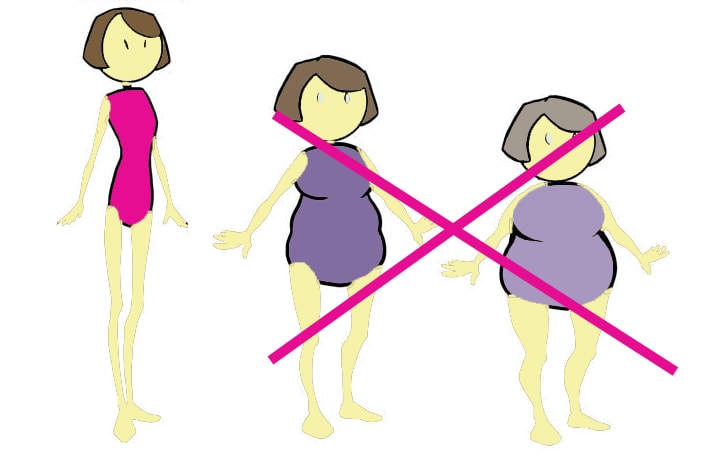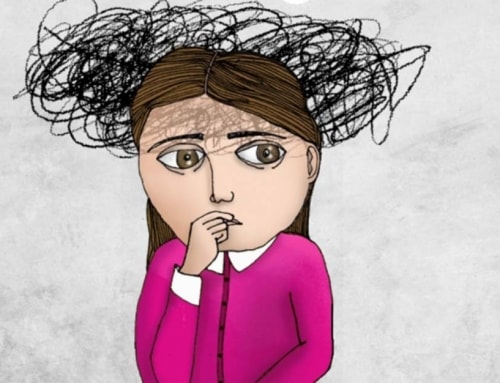As you get older, you might notice that maintaining your usual weight becomes more difficult. You’re not alone though, many women gain weight around the menopause.
But menopause weight gain isn’t inevitable and you can reverse it or stop it in its tracks.
What is the cause of menopause weight gain?
The hormonal changes of menopause might make you more likely to gain weight around your abdomen than around your hips and thighs. But, hormonal changes alone don’t necessarily cause menopause weight gain. Instead, the weight gain is usually related to aging, as well as lifestyle and genetic factors.
Muscle loss and fat increase
For example, muscle mass typically diminishes with age, while fat increases. Loss of muscle mass decreases the rate at which your body uses calories, which can make it more challenging to maintain a healthy weight. If you continue to eat as you always have and don’t increase your physical activity, you’re likely to gain weight.
Genetics
Genetic factors also might play a role in menopause weight gain. If your parents or other close relatives carry extra weight around the abdomen, you’re likely to do the same.
Sleep
Other factors, such as a lack of exercise, unhealthy eating and not enough sleep, might contribute to menopause weight gain. When people don’t get enough sleep, they tend to snack more and consume more calories.
Comfort Eating
Often during the menopause, your body will be going through lots of changes. In particular, the temperature fluctuations that result in hot flushes can really wear you down. This in turn can lead to comfort eating! So beware of your own ability to make the prophecy of menopause weight gain a reality!
How risky is weight gain in your 50’s?
Menopause weight gain can have serious implications for your health. Being over weight increases the risk of heart disease, type 2 diabetes, breathing problems and various types of cancer, including breast, colon and endometrial cancer.
How to prevent menopause weight gain
Exercise
Move more. Aerobic activity can help you shed excess pounds and maintain a healthy weight. Strength training counts, too. As you gain muscle, your body burns calories more efficiently — which makes it easier to control your weight.
For most healthy adults, experts recommend moderate aerobic activity, such as brisk walking, for at least 150 minutes a week or vigorous aerobic activity, such as jogging, for at least 75 minutes a week. In addition, strength training exercises are recommended at least twice a week. If you want to lose weight or meet specific fitness goals, you might need to exercise more.
Diet and Nutrition
Eat less. To maintain your current weight — let alone lose excess pounds — you might need about 200 fewer calories a day during your 50s than you did during your 30s and 40s. Check your ideal weight and your calorie needs in our weight loss calculators and charts.
To reduce calories without skimping on nutrition, pay attention to what you’re eating and drinking. Choose more fruits, vegetables and whole grains, particularly those that are less processed and contain more fiber.
Check your sweet habit. Cut out or reduce added sugars. Eliminate sugar-sweetened drinks, such as soft drinks, juices, energy drinks, flavoured waters, and sweetened coffee or tea.
Other foods that contribute to excess dietary sugar include biscuits, pies, cakes, doughnuts, ice cream and sweets.
Limit alcohol. Alcoholic drinks add excess calories to your diet and increase the risk of gaining weight.
Use our free diet planner to see what you can eat based on how much you exercise – It’ll even tell you what day you will reach your ideal weight!
Focus
It’s up to you to handles the stress that causes menopause comfor eating, but we can tell you how Anni coped with a period of stress during the meopause and got her weight gain back under control in her 50’s.
Remember, successful weight loss at requires permanent changes in diet and exercise habits. Commit to lifestyle changes and enjoy a healthier you to prevent and reverse that pesky menopause weight gain.




Leave A Comment